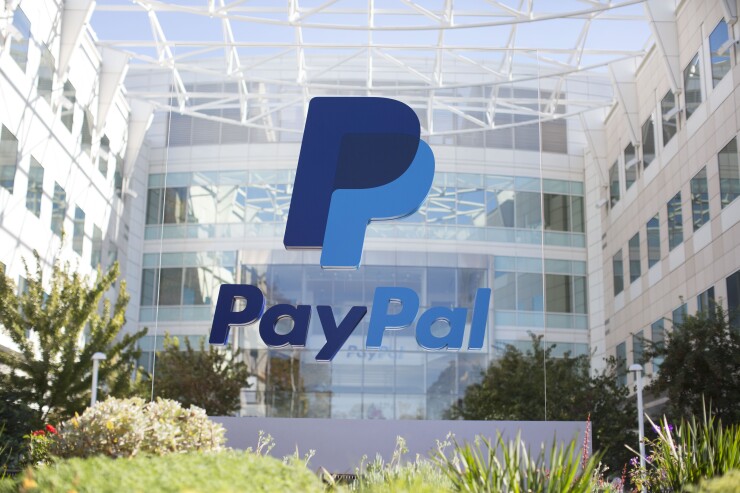PayPal has committed money and other resources to a new initiative to detect human trafficking.
It has formed a financial intelligence unit with Polaris, a nonprofit organization that runs the U.S. National Human Trafficking Hotline, and with Freedom Network USA, an anti-trafficking coalition. Bank experts, victims, government officials, nonprofit leaders, law enforcement authorities and other participants in the unit will collaborate to identify human traffickers and potentially bring them to justice.
The idea for the new unit grew out of the findings of a recent report Polaris conducted on human trafficking. It concluded that financial services companies, especially players like San Jose, Calif.-based PayPal, were best positioned to help solve the problem by making it more difficult for traffickers to move money.

Financial institutions have a long history of helping with such work.
However, spotting traffickers is easier said than done. The criminals are often well versed in banking's anti-money- laundering and suspicious-activity-reporting requirements, and they know how to lower their profiles.
What the new unit will do
Polaris has trained more than 2,000 financial services and anti-money-laundering professionals and collaborated on a new, public platform that lets these people share knowledge, information and best practices in real time.
The financial intelligence unit will analyze the tens of thousands of conversations Polaris has with victims and witnesses through its hotline. It will research how human traffickers misuse legitimate financial institutions and what kinds of clues they leave in financial records. It will also collaborate with law enforcement, nonprofits, banks and payment companies on detection methods and the steps leading to prosecution.
“This work may take multiple forms including engaging [former victims] to collaborate on research projects through which they can share their insights into how traffickers operate,” said Sara Crowe, director of the financial systems initiative at Polaris.
The new unit will also organize meetings and other opportunities for experts to learn from each other.
“These may be in closed-door sessions, through a knowledge-sharing platform we are developing for vetted AML professionals, or through working groups on specific topics,” Crowe said.
Survivors, law enforcement authorities and officials of nonprofit organizations might meet with bankers and payment executives to explain how forced labor occurs in a particular industry, and the group might brainstorm on specific red flags that banks and law enforcement should look for.
The bank members might review the accounts of people convicted of trafficking to see if there was a pattern in their financial records that could have been identified earlier. They might review previously filed suspicious activity reports and look for transactions that did not seem unusual in isolation but show up in multiple SARs. The group would then come back together to share the new findings.
PayPal is funding the unit for the next two years and providing technical expertise, "including the financial institution perspective which is critical,” Crowe said. “Understanding what information a financial institution does and does not have access to is essential to develop typologies. PayPal may also share patterns they have identified, participate in or consult on specific research projects, and be available to answer questions like, is it common for X type of entity to have Y kind of behavior?”
How PayPal got into this
Aaron Karczmer, PayPal's chief risk officer and a former prosecutor in the Manhattan District Attorney’s office, is leading the company's anti-trafficking effort. He said CEO Dan Schulman is "quite passionate" about the issue.
"We've made investments over the last four to five years bringing on very talented folks, empowering them to make great cases and make a difference,” Karczmer said.
The new unit will help Polaris act as the connection point between law enforcement and the private sector and encourage data-driven legal cases, Karczmer said.
“Polaris has come to believe, as do we, that financial crime prosecution is an incredible tool to fight human traffickers because it's a way to be able to put a stop to them, and interfere with their money flows in a way that minimizes and in some cases eliminates the need to have victims testify,” Karczmer said.
“When you have human trafficking cases that require victim testimony, it's very hard on those victims or witnesses. Financial crime prosecutions can limit the need for that and sometimes eliminate it altogether," he said. "If you have alternative mechanisms of stopping those human traffickers without having to put victims through additional difficulties, obviously that's something we would all like to do.”
PayPal says it does not provide data to Polaris — it sees that as a potential data privacy violation. It does use the information it gets from Polaris and others in its own AML and financial crime investigative work. PayPal has more than 1,500 investigators who work on drug trafficking and criminal cases.
“Every day we get intelligence from our own systems and from external relationships with law enforcement or elsewhere,” Karczmer said. “If we get any type of indicator, we assign it to an investigator. They have a variety of tools at their disposal, they are very well trained and they have a deep understanding of how law enforcement works. They will then uncover whatever activity may exist."





